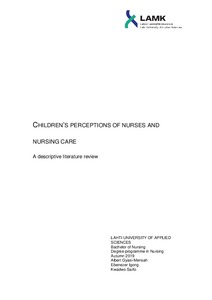Digital Finnish Vocabulary of Basic Daily Activities : Educational Material for Nursing Students
Okeke, Chukwuemeka David; Johnson, Omokagbo Paul (2024)
Okeke, Chukwuemeka David
Johnson, Omokagbo Paul
2024
All rights reserved. This publication is copyrighted. You may download, display and print it for Your own personal use. Commercial use is prohibited.
Julkaisun pysyvä osoite on
https://urn.fi/URN:NBN:fi:amk-2024121335448
https://urn.fi/URN:NBN:fi:amk-2024121335448
Tiivistelmä
Recently, according to Helsinki times, there has been large influx of international students majorly from South Asian countries like Bangladesh, Sri Lanka, and India, coming to study in Finland. Some proportions of these students are studying health related courses like nursing, and physiotherapy. when they graduated, they will fill in the current job shortages in healthcare.
The purpose of this thesis is to create a digital Finnish vocabulary of basic daily activities that covers common day-to-day activities such as personal hygiene, mobility, toileting, dressing, eating, and transfers. The project objectives focus on two main areas. First, the content of the dictionary will improve and enlarge nursing students Finnish vocabulary, of common or basic vocabularies needed in activities of daily living, especially when they are in clinical placements such as nursing homes. Second, native Finnish nursing students and healthcare staffs can utilize this dictionary to connect their Finnish vocabulary with the English vocabulary needed in nursing field.
The waterfall project methodology was used in the implementation of this project. This method was chosen because we had a clear upfront requirement, such as potential project requirements, documents, deadlines, and guideline, fixed timeline, and budget.
The vocabulary created has six sections covering common day-to-day activities such as personal hygiene, mobility, shower, dressing, eating, and common phrases. These sections are distinguished by different colour codes, colours influence how readers perceive information and can either hinder or boost their learning process. The vocabulary contained few limited errors in translation.
The information contained in this thesis work strictly followed SAMK requirements from reliable and trustworthy sources. Ethical principles were adhered to following TENK. During the thesis project, the authors carefully ensured most of the information are from reliable databases such as CINAHL, Finna, Google Scholar and PubMed, even though non-reliable websites like study info, Helsinki times, google were also used.
The purpose of this thesis is to create a digital Finnish vocabulary of basic daily activities that covers common day-to-day activities such as personal hygiene, mobility, toileting, dressing, eating, and transfers. The project objectives focus on two main areas. First, the content of the dictionary will improve and enlarge nursing students Finnish vocabulary, of common or basic vocabularies needed in activities of daily living, especially when they are in clinical placements such as nursing homes. Second, native Finnish nursing students and healthcare staffs can utilize this dictionary to connect their Finnish vocabulary with the English vocabulary needed in nursing field.
The waterfall project methodology was used in the implementation of this project. This method was chosen because we had a clear upfront requirement, such as potential project requirements, documents, deadlines, and guideline, fixed timeline, and budget.
The vocabulary created has six sections covering common day-to-day activities such as personal hygiene, mobility, shower, dressing, eating, and common phrases. These sections are distinguished by different colour codes, colours influence how readers perceive information and can either hinder or boost their learning process. The vocabulary contained few limited errors in translation.
The information contained in this thesis work strictly followed SAMK requirements from reliable and trustworthy sources. Ethical principles were adhered to following TENK. During the thesis project, the authors carefully ensured most of the information are from reliable databases such as CINAHL, Finna, Google Scholar and PubMed, even though non-reliable websites like study info, Helsinki times, google were also used.
Kokoelmat
Samankaltainen aineisto
Näytetään aineisto, joilla on samankaltaisia nimekkeitä, tekijöitä tai asiasanoja.
-
Virtual Reality and its use in surgical nursing training : a literature review into the effectiveness of Virtual Reality as a new practical educational method for training Registered Nurses in surgical nursing
Jokinen, Felipe Ignacio (2021)The general purpose of this thesis was to review the literature available to Virtual Reality to ascertain if the technology has a possibility to augment or become a more effective way to train Registered Nurse students in ... -
Cultural Diversity in Finnish Health Care: A COMPARISON OF NURSE MANAGERS, NATIVE-FINNISH REGISTERED NURSES, AND IMMIGRANT REGISTERED NURSES PERSPECTIVES AND EXPERIENCES OF CULTURAL DIVERSITY IN THE FINNISH HEALTHCARE WORK ENVIRONMENT
Atanga, Josephine; Mwangi, Caroline; Ghimire, Dibya (2022)Background: There is a global scarcity of healthcare workers, particularly in Western countries such as Finland resulting in a greater reliance on foreign-trained professionals to fill the gap in the nursing workforce. ...Rajoitettu käyttöoikeus / Restricted access / Tillgången begränsad -
Children's perceptions of nurses and nursing care : A descriptive literature review
Gyasi-Mensah, Albert; Sarfo, Kwadwo; Igong, Ebenezer (2019)Hospitalization can be a very stressful and traumatic experience for children. Children have a limited understanding of procedures and hospital environment. Thus, it is even more important for health care professionals to ...


